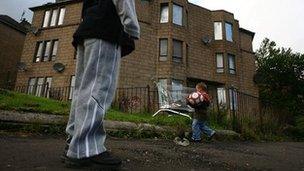Scotland's inequality 'widening', Oxfam warns
- Published

The report said too many Scots were affected by high mortality rates, economic poverty and ill-health
Scotland's wealthiest households are now 273-times better off than the most deprived, according to a report.
Oxfam Scotland said the gap between rich and poor was widening - with equality made worse by the tax and benefits system.
The charity called for the current economic model to be "fundamentally changed".
The Scottish government said it would consider the report, including its calls for a Poverty Commissioner.
Oxfam Scotland's report, Our Economy, external, analyses trends and urges a focus on "creating livelihoods for the many, not profits for the few".
It said research had shown that the top 10% of households in terms of wealth were 273 better off than the bottom 10% - with the gap likely to widen.
'Deepening inequalities'
The authors said: "Scotland is one of the most unequal societies in the developed world. The wealthiest households are 273 times richer than the poorest households. This looks likely to widen in future years.
"In 2012 Scotland's 100 richest men and women increased their fortunes to £21bn, up from a combined wealth of £18bn in 2011. These deepening inequalities are accentuated by the declining progressivity of the UK tax and benefits system - which should address rather than exacerbate inequality."
It proposes the creation of a Poverty Commissioner for Scotland; a duty for public authorities to make sure all their policies reduce poverty and inequality; the creation of a Scottish Ethical Business Initiative; setting out acceptable behaviour for businesses operating in Scotland and a more progressive tax system.
The notion that work pays is also challenged, with the authors pointing out that the number of workers who live in poverty has gone from 255,000 to 280,000 since 2008.
The report said that working tax credits were "effectively subsidies from the public purse to employers paying poverty wages", and that all employers should pay a living wage.
Businesses paying less than the living wage cost society between £5.9bn and £6.3bn each year, the report stated.
It added: "In recent decades, the Scottish economy has been transformed from one based on manufacturing to a service-led, supposedly 'knowledge economy'.
"Retail and call centres have expanded to (partly) fill the void left by the demise of manufacturing. Service jobs have replaced skilled trades. Yet these new jobs do not necessarily offer a route out of poverty: many roles simply do not pay enough to live on, far less build for the future.
"Experiencing poverty in this rich country is also intensely stressful.
"Stigmatisation through media and political rhetoric adds to individuals' sense of anguish and isolation. They, not society, nor the economy, are blamed for their poverty. Meanwhile, pressures to consume abound in a culture that elevates status and image above relationships, community contribution or care for the environment."
'New prosperity'
Judith Robertson, head of Oxfam Scotland, said she believed the existing economic model was not working.
She added: "Despite decades of economic growth and a myriad of anti-poverty policies, the reality for too many Scots is a cocktail of high mortality, economic inactivity, mental and physical ill-health, poor educational attainment and exclusion from the decisions that affect them.
"This is a structural problem caused by the economy. If we are serious about tackling these issues, then our politicians and policymakers need to make a fundamental change. Without that change, poverty and inequality will continue to shame us and drag all of us down for generations to come.
"We need to create a new prosperity that will benefit everyone in society. At the heart of this new prosperity would be community-led economies which focus on the quality and distribution of growth, creating livelihoods for the many, not profits for the few.
"Our economy shows this is practical and achievable. We just need the will to work together to make it happen."
Deputy First Minister Nicola Sturgeon said: "Scotland is a wealthy country, but the reality is that the Westminster system has utterly failed to address the deep social inequalities which exist in Scottish society - indeed under successive Westminster governments those inequalities have been allowed to widen.
"Tackling and reversing that picture of inequality requires political will - but more fundamentally for Scotland it needs the key economic and social policy levers to be in the hands of the Scottish Parliament. "
Last week, figures from Scotland's chief statistician, external showed the number of people living in relative poverty had fallen slightly, from 780,000 in 2010/11 to 710,000 in 2011/12.
But the statistics showed there had also been a fall in the average household earnings in Scotland.
Scotland's Deputy First Minister, Nicola Sturgeon, welcomed the report, which she said "merely confirms what we have long known to be the case, which is that the UK is one of the most unequal countries in the developed world."
Ms Sturgeon added: "We will consider Oxfam's recommendations, including their proposal for a Poverty Commissioner, as we take forward our programme of work outlining the shape of an independent Scotland. Independence will give us the opportunity to create a fairer, more equal Scotland."
- Published13 June 2013
- Published2 November 2012
- Published10 January 2012